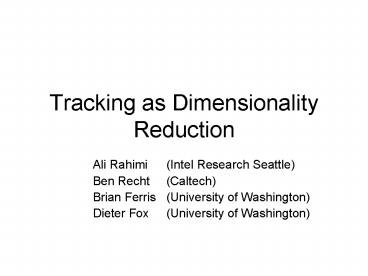Tracking as Dimensionality Reduction - PowerPoint PPT Presentation
1 / 39
Title:
Tracking as Dimensionality Reduction
Description:
Steal Some Good Ideas. Manifold Learning. f is 1:1. Nonlinear System ID ... LEARNING TO TRACK in VIDEOS: Mapping appearance to pose. Observed image. sequence ... – PowerPoint PPT presentation
Number of Views:40
Avg rating:3.0/5.0
Title: Tracking as Dimensionality Reduction
1
Tracking as Dimensionality Reduction
- Ali Rahimi (Intel Research Seattle)
- Ben Recht (Caltech)
- Brian Ferris (University of Washington)
- Dieter Fox (University of Washington)
2
Tracking as Dimensionality Reduction
11 and smooth
Want these
Given only this
3
Ferris, Fox, Lawrence, IJCI 06
4
Taylor, Rahimi, Bachrach, Shrobe, IPSN 06
5
Rahimi, Recht, NIPS 06
6
Rahimi, Recht, CVPR 05
7
WiFi localization
RFID tags
Sensor networks
RF tracking devices
Video
8
Lessons
- Utilize time information
- Avoid local minima
- Use plausible models
9
Lesson 1 Use Time
Low-dimensional latent variables
Sensor
High-dimensional Observations
10
Lesson 1 Use Time
- For smooth time series data
- ST-Isomap (Jenkins) gt Isomap
- DGPLVM (WangFleetHertzman) gt GPLVM
- RahimiRecht gt KPCA
11
The Sensetable
Signal strength measurements from tag
RFID tag
12
Sensetable Manifold Learning
LLE
KPCA
Ground Truth
Isomap
Ground Truth
ST-Isomap
RahimiRecht 06
13
Lesson 2 Avoid Local Minima
- What good is a local max of the posterior?
(It may be arbitrarily improbable)
14
Lesson 2 Avoid Local Minima
Wi-Fi localization ground truth
Recovered by DGPLVM with PPCA initializer
15
Lesson 2 Avoid Local Minima
Wi-Fi localization ground truth
Recovered by DGPLVM with Isomap initializer
16
Lesson 2 Avoid Local Minima
17
Lesson 3 Manifold Learning is a Red Herring for
Tracking
- Pros No local mins, fast.
- Cons
- Inapplicable assumptions Isometry, LLE
- Only asymptotic guarantees (not MAP estimate, for
example)
18
An Algorithm
- Dynamical model
- MAP estimate of f
- No local mins
- Approximation guarantees
19
Why Its Hard
Hairy hairy integral
This integral is hard in general
EM cant even get us a local max of this!
20
Steal Some Good Ideas
Manifold Learning f is 11
Nonlinear System ID (EM) prior on X
Y is obtained via change of variable on X
21
Two assumptions to simplify marginalization
22
Final cost function
Outputs should be likely
Mapping cant collapse to zero
Represent g with kernels on observations
23
APPROXIMATE OPTIMUM 1 Using dual relaxation
Not convex in C. Convex in ZCC. Solve by
SDP. Extract solution by SVD. Gives bounds on
solution.
APPROXIMATE OPTIMUM 2 Using spectral relaxation
Find g that gives most likely X while matching
moments of prior. Results in dynamic-augmented
KPCA. Exact in the linear case.
24
The Sensetable
Signal strength measurements from tag
RFID tag
25
Sensetable Manifold Learning
LLE
KPCA
Ground Truth
Isomap
Ground Truth
ST-Isomap
RahimiRecht 06
26
Applying g
27
Tracking with KPCA
28
Unsupervised Learning in Sensor Networks
Unknown sensor locations Unknown smooth
measurement model Unknown smooth path
Output as a funtcion of distance for various
sensors.
29
target position
30
True trajectory
Recovered Up to scale and 90 rotation
31
Unknown measurement process
Measurements
g
Unknown sensor locations Unknown smooth
measurement model Unknown smooth path
32
Conclusion
- Lessons for learning trackers
- Utilize time
- Avoid local mins
- Plausible models
- Requests
- Quantify errors
- Online updates
33
(No Transcript)
34
Request Online Updates
- f changes over time.
RF Signal strengths After a chair moves
voltage
time
35
Request Quantify errors
- Needed for
- Algorithm development
- Parameter tuning
36
Visualization vs. Tracking
From the Isomap page
37
Request Quantify errors
- Dont penalize errors in scale, translation,
rotation. - Do penalize incorrect choice of subspace,
folding, changes in topology, nonlinear
stretching, etc - We use affine registration error
38
LEARNING TO TRACK in UNCALIBRATED SENSOR
NETWORKS Mapping scalar sensor outputs to
location
Trajectory through sensor net
Measurements from all nodes
Recovered trajectory
Test trajectory
Applying g
Applying g from KPCA
39
LEARNING TO TRACK in VIDEOS Mapping appearance
to pose
True rotation
Recovered rotation
Unsup w/ dynamics
Observed image sequence

